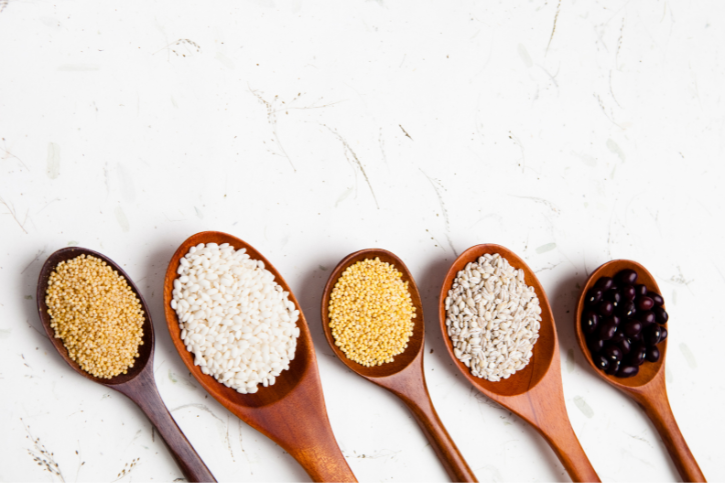
July 19, 2022 2 min read
Millet, Barley, and Basmati are three incredibly nutritious, heart healthy supergrains that are helpful with regulating blood pressure, cholesterol, and blood sugar levels.
Millet
Millet is a gluten-free ancient grain. Often bought hulled to be ready to eat, it has a slightly sweet flavor and can be eaten whole or mashed.
Millet is very high in dietary fiber, meaning it is also great for a healthy digestive tract. It is also tich in vitamins and minerals such as copper, magnesium, manganese, and phosphorus.
The benefits of eating milled may include lower blood pressure and a reduced risk of heart disease. Millet is said to help control blood sugar levels also. It is rich in antioxidants that are said to be instrumental in stopping free radical cells that cause cancer.

Barley
Barley comes in four different forms, hulled, hulless, pearled, or flour.
Barley is a true whole grain that is high in fiber. Its insoluble fiber means it helps the digestive system process the food, meaning it's necessary for healthy digestion. The fiber in barley also helps with cravings and serves as an appetite suppressant, as it digests slower than other foods and keeps you feeling full.
Eating barley may lead to lower cholesterol levels and a reduced risk of heart problems. Barley is packed full of many vitamins and minerals. The main nutrients barley provides are vitamin A, vitamin E, magnesium, phosphorus, copper, potassium, folate, niacin, and selenium.

Brown Basmati Rice
Basmati rice is another heart-healthy grain that lowers cholesterol and controls blood sugar levels.
Rich in B vitamins, basmati rice is good for your brain. The main minerals basmati contains are magnesium and potassium. Potassium helps with circulation and magnesium helps prevent and stop inflammation.
This grain is another fiber-rich grain that helps promote a healthy digestive tract.
Basmati rice does contain some complex carbs, meaning it is a high-energy grain. The magnesium in basmati also contributes to sustained energy levels.
❤ Try our USDA certified organic Hulled Millet, Hulled Barley, Hulless Barley, Pearled Barley, Barley Flour, and Brown Basmati Rice ❤
Thanks for reading this Be Still Farms Blog article. To sign up for more news/articles and/or recipes, click here. For more about us, click here. To shop our certified organic products, click here.
Please comment and share and we look forward to serving you in the future!
Comments will be approved before showing up.

January 27, 2025 3 min read
Flaxseed, the tiny yet powerful superfood, is packed with nutrients that can support weight loss. From curbing hunger to stabilizing blood sugar, this guide dives into the science of how flaxseed can help you shed those extra pounds.

December 11, 2024 3 min read
Discover three quick and easy soup recipes featuring organic small red beans. From a classic vegetable soup to a creamy potato blend, these wholesome recipes are perfect for chilly days and busy weeknights. Packed with flavor and nutrition, these soups will warm your heart and soul this winter!

December 06, 2024 3 min read
This vibrant and nutritious Green Lentil Salad combines tender lentils with grilled chicken, fresh vegetables, and a zesty lemon dressing. Packed with protein, fiber, and essential vitamins, it’s the perfect healthy meal for any time of day.
© 2026 Be Still Farms- Real, Fine Organics.
Privacy | Terms | Refund Policy | Organic Certification
